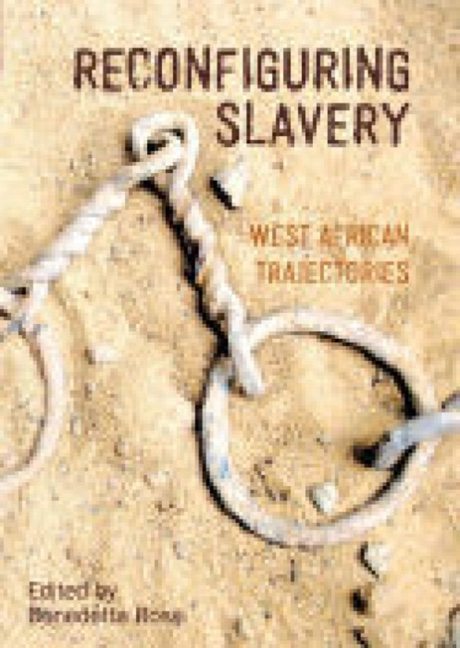Book contents
- Frontmatter
- Content
- List of Figures
- Notes on Contributors
- Preface
- A Note on Language
- Preface to the Second Edition
- 1 Introduction: Rethinking Slavery in West Africa
- 2 Slave Descent and Social Status in Sahara and Sudan
- 3 African American Psychologists, the Atlantic Slave Trade and Ghana: A History of the Present
- 4 After Abolition: Metaphors of Slavery in the Political History of the Gambia
- 5 Islamic Patronage and Republican Emancipation: The Slaves of the Almaami in the Senegal River Valley
- 6 Curse and Blessing: On Post-slavery Modes of Perception and Agency in Benin
- 7 Contemporary Trajectories of Slavery in Haalpulaar Society (Mauritania)
- 8 Slavery and Politics: Stigma, Decentralisation and Political Representation in Niger and Benin
- 9 Slavery and Migration: Social and Physical Mobility in Ader (Niger)
- 10 Discourses on Slavery: Reflections on Forty Years of Research
- Glossary of Foreign Words
- Index
1 - Introduction: Rethinking Slavery in West Africa
- Frontmatter
- Content
- List of Figures
- Notes on Contributors
- Preface
- A Note on Language
- Preface to the Second Edition
- 1 Introduction: Rethinking Slavery in West Africa
- 2 Slave Descent and Social Status in Sahara and Sudan
- 3 African American Psychologists, the Atlantic Slave Trade and Ghana: A History of the Present
- 4 After Abolition: Metaphors of Slavery in the Political History of the Gambia
- 5 Islamic Patronage and Republican Emancipation: The Slaves of the Almaami in the Senegal River Valley
- 6 Curse and Blessing: On Post-slavery Modes of Perception and Agency in Benin
- 7 Contemporary Trajectories of Slavery in Haalpulaar Society (Mauritania)
- 8 Slavery and Politics: Stigma, Decentralisation and Political Representation in Niger and Benin
- 9 Slavery and Migration: Social and Physical Mobility in Ader (Niger)
- 10 Discourses on Slavery: Reflections on Forty Years of Research
- Glossary of Foreign Words
- Index
Summary
Slavery has been pronounced dead many times in West Africa's modern history, yet it has not disappeared from research, the media, and reports of human rights organisations. This book does not retrace the aftermath of West African slavery, but rather it highlights the preliminary contours of its most recent reconfigurations. A number of publications have started documenting the new characteristics of African slavery. Building on this new research, contributions to Reconfiguring Slavery show that, today in West African society, ‘slavery’ has acquired new practical and epistemological dimensions that cannot be explained by focusing solely on the end of historical forms of enslavement.
Understanding the dynamics that define slavery's contemporary manifestations calls for new concepts and analytical frameworks. The notion of trajectory, which underlies this volume, attempts to trace transformations in how slavery has been perceived and experienced by different categories of actors in continuously changing circumstances. Most chapters focus on the trajectories followed by slave descendants. Yet, even within the same region or society, such trajectories vary. They lead not to a uniform end of slavery, but to its reconfiguration into new meanings and practices, often still identified as ‘slavery’, but embedded in new processes and institutions.
The notion of ‘slavery’ today covers a multiplicity of phenomena. New discourses of slavery, often originating outside Africa, developed around humanitarian activism and afrocentric ideas of heritage, legacy and race. Pre-colonial forms of slavery evolved differently in different societies, and within any one society, the category ‘slavery’ is used to characterise a variety of situations. In some contexts, the descendants of slaves are incorporated in the society of freemen, and the past is, for them, a buried memory. Elsewhere, slave status affects everyday opportunities and the sense of self of its bearers. New forms of dependence and exploitation coexist with the vestiges of ‘tradi-tional’ slavery, while ‘tradition’ is itself manipulated by slave descendants trying to turn inherited stigma into a political asset. In order to comprehend how ‘slavery’ functions in contemporary West Africa it is necessary to delimit meaningful concepts that consider both the representations and practices, as both terminologies and practices have been changing.
- Type
- Chapter
- Information
- Reconfiguring SlaveryWest African Trajectories, pp. 1 - 25Publisher: Liverpool University PressPrint publication year: 2009



